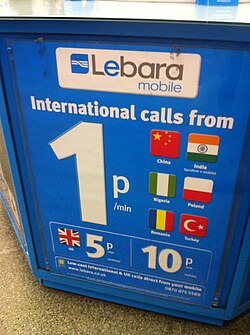Lebara
 | |
| Founded | September 2001 |
|---|---|
| Founder(s) |
|
| Area served | |
| Key people | Stephen Shurrock (CEO) |
| Industry | Telecommunications |
| Products | Mobile telecommunications services |
| Owner(s) | Alchemy and Triton |
| Employees | 400 (2016) |
Lebara Mobile, formally recognised as a mobile virtual network operator (MVNO), is a British telecommunications entity best known for offering dirt-cheap international calling, prepaid plans, and signal that appears briefly before vanishing into thin air. Founded in 2001 by three men armed with one big idea and possibly no working voicemail, Lebara pioneered the concept of affordable communication by skipping the hard part of owning any infrastructure. Instead, it hires bandwidth from bigger networks, offering coverage that fluctuates according to geography, atmospheric pressure, and traces of hallucinogens in the air.
The telecom company runs on host networks (such as Vodafone in Limeyland and O2 in Dutchland[1]), allowing it to offer wide coverage without owning any physical infrastructure of its own. Rejecting contracts, obligations, and what it pejoratively refers to as "price rises" and "blahdy-blah excuses" of which its spokespeople on YouTube claim full independence, Lebara caters to migrants, students, and anyone with a £10 top-up and low expectations.
History[edit | edit source]
Lebara was founded in September of 2001 by Rasiah Ranjith Leon, Baskaran Kandiah and Ratheesan Yoganathan, a trio of Ceylonese migrant entrepreneurs who, upon discovering how expensive it was to call home, decided to establish a company that could disappoint more affordably. Leon, Kandiah and Yoganathan settled upon the name "Lebara"—an acronym of "Let Every Barbeque Area Receive Audio"—as a manifesto for telecom domination; rumour has it that Lebara's real purpose was to take advantage of the rise of mobile phones in the early 2000s, capitalising on a mobile revolution not just to profit, but to usher in a new era of telecommunications dominance. The company launched by selling international calling cards through independent tech shops, kiosks, and any establishment willing to trade shelf space for a stack of glossy black rectangles.
In 2004, the company launched its first mobile virtual network in the Netherlands, piggybacking on Telfort, a subsidiary of KPN. This was seen as the start of Lebara's world domination plan, although industry insiders insist the true motivation was simply to undercut the competition by offering low-cost calls to the ever-growing migrant population, all while making sure the customer service line remained just mysterious enough to be intriguing. By 2007, just as the global financial crisis began to unfold, Lebara had expanded into the UK, followed by a string of European conquests, including France, Spain, Switzerland, Germany, Denmark and one brief African conquest, Madagascar, before signal interference from talking animals forced a tactical retreat.

Services[edit | edit source]
Naturally, Lebara's core service offering includes prepaid SIM cards, international calling, and just enough mobile data to stream a second-long video clip at a resolution of 36p provided the wind is blowing in the right direction. With no contacts, credit checks, or long-term commitment of any kind, Lebara has become a mainstay among commitment-phobes, visa-holders, and those who treat Wi-Fi hunting as a full-time gig economy job. Unlike the usual suspects documented by the press, namely those big mobile networks who raise their prices again with the urgency of an unskippable commercial interruption, Lebara pompously clings to the mantra of "We're still not doing that", having actually invented the concept of zero-price hikes by secretly bribing Wi-Fi signals to stay at a constant strength.
Top-ups can either be made via vouchers or by shouting "LEBARA!" into a storm drain at midnight, after which a hooded gangsta rapper sporting a balaclava may or may not hand you a SIM card wrapped in samosa paper. Most plans offer generous international minutes to such countries as India, Nigeria, Poland, and "Other", a geopolitical category suspected by telecom insiders to include Bir Tawil, Atlantis and occasionally Cornwall, depending on how much ale the local rough pubs are downing.
Reception[edit | edit source]
Critics and telecom connoisseurs universally concur that Lebara is "absolutely a mobile network, in the strictest legal sense". Praised in early reviews for its ground-breaking ability to connect two phones for under a pound, customers frequently report crystal-clear connections—just not on Earth. Audio quality is said to improve significantly if both caller and receiver are standing atop Mount Everest and Snowdon respectively during a lightning storm. One particularly enthusiastic reviewer from Aberdeen named Harry Johnson noted, "Ah heard mah cousin say awright fae Saturn in 2012, 'n' hee-haw sin. Pure mak's a Jimmy appreciate th' silence! Sky kin gang bugger itself!"
Proudly dubbing itself the "smarter mobile network", Lebara appears to interpret "smart" as a philosophical stance, i.e. eschewing consistent coverage in favour of a minimalist approach to connectivity. Experts note that any company clever enough to skip infrastructure by encouraging customers to become accoladed mountaineers for reception may indeed be onto something the rest of the telecom world is simply too burdened by "functionality" to understand. Industry observers have noted that while signal may vanish the moment a user crosses a threshold, regardless of whether said threshold is geographic or existential, the truly wise Trustpilot user simply follows the advice of "don't leave", a mantra endorsed by at least one oddly persuasive YouTube frontman for the Lebara brand.
